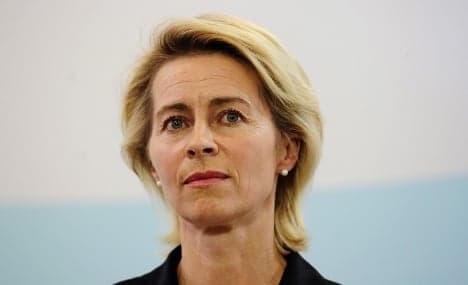Von der Leyern defends welfare changes

German Labour Minister Ursula von der Leyen on Thursday defended her proposed changes to the country’s Hartz IV welfare benefits against criticism from the opposition, which has said the plans are still too vague.
The new combination of benefits “shows best what the people can spend and on what,” she told broadcaster Deutschlandfunk.
Von der Leyen had announced on Monday some details about her plans for “non-cash” benefits, such as a chip card that gives needy children access to educational and recreational services. She also said that she planned the rates to rise in harmony with wage increases and inflation, but did not give exact numbers.
The newly calculated rates would make some 60,000 previously excluded households eligible for the benefits, she said on Thursday, explaining that new data from the National Statistics Office on consumers and income had been part of the new scheme’s creation.
“This is the edge under which a person cannot be allowed to fall if they live from state aid alone,” she told the broadcaster.
The ongoing question of whether the rates will be increases hinges on wage and inflation developments, she said.
Von der Leyen also defended “non-cash” benefits, saying there would still be a possibility to transfer the money to parents. “Let’s use this money sensibly so that the activity will actually be organised for the child,” she said.
Access to education and a warm midday meal should not be left to chance, the minister said.
Payments through vouchers are not discrimination as some critics have claimed, she said. Real discrimination is when children can’t participate in field trips and other activities because their families don’t have the money.
The country’s Constitutional Court recently ruled that the terminology and payment system for welfare benefits was too confusing and must be changed by the end of the year. The current basic payment is €359 per month, but critics say this should be increased to at least €420.
Hartz IV was named after Peter Hartz, the head of a commission that suggested changes to Germany's labour market and welfare system in 2002. It specifically refers to long-term unemployment benefits instituted in 2005, and has become synonymous with former Chancellor Gerhard Schröder's highly unpopular Agenda 2010 reforms.
DPAD/ka
Comments
See Also
The new combination of benefits “shows best what the people can spend and on what,” she told broadcaster Deutschlandfunk.
Von der Leyen had announced on Monday some details about her plans for “non-cash” benefits, such as a chip card that gives needy children access to educational and recreational services. She also said that she planned the rates to rise in harmony with wage increases and inflation, but did not give exact numbers.
The newly calculated rates would make some 60,000 previously excluded households eligible for the benefits, she said on Thursday, explaining that new data from the National Statistics Office on consumers and income had been part of the new scheme’s creation.
“This is the edge under which a person cannot be allowed to fall if they live from state aid alone,” she told the broadcaster.
The ongoing question of whether the rates will be increases hinges on wage and inflation developments, she said.
Von der Leyen also defended “non-cash” benefits, saying there would still be a possibility to transfer the money to parents. “Let’s use this money sensibly so that the activity will actually be organised for the child,” she said.
Access to education and a warm midday meal should not be left to chance, the minister said.
Payments through vouchers are not discrimination as some critics have claimed, she said. Real discrimination is when children can’t participate in field trips and other activities because their families don’t have the money.
The country’s Constitutional Court recently ruled that the terminology and payment system for welfare benefits was too confusing and must be changed by the end of the year. The current basic payment is €359 per month, but critics say this should be increased to at least €420.
Hartz IV was named after Peter Hartz, the head of a commission that suggested changes to Germany's labour market and welfare system in 2002. It specifically refers to long-term unemployment benefits instituted in 2005, and has become synonymous with former Chancellor Gerhard Schröder's highly unpopular Agenda 2010 reforms.
DPAD/ka
Join the conversation in our comments section below. Share your own views and experience and if you have a question or suggestion for our journalists then email us at [email protected].
Please keep comments civil, constructive and on topic – and make sure to read our terms of use before getting involved.
Please log in here to leave a comment.